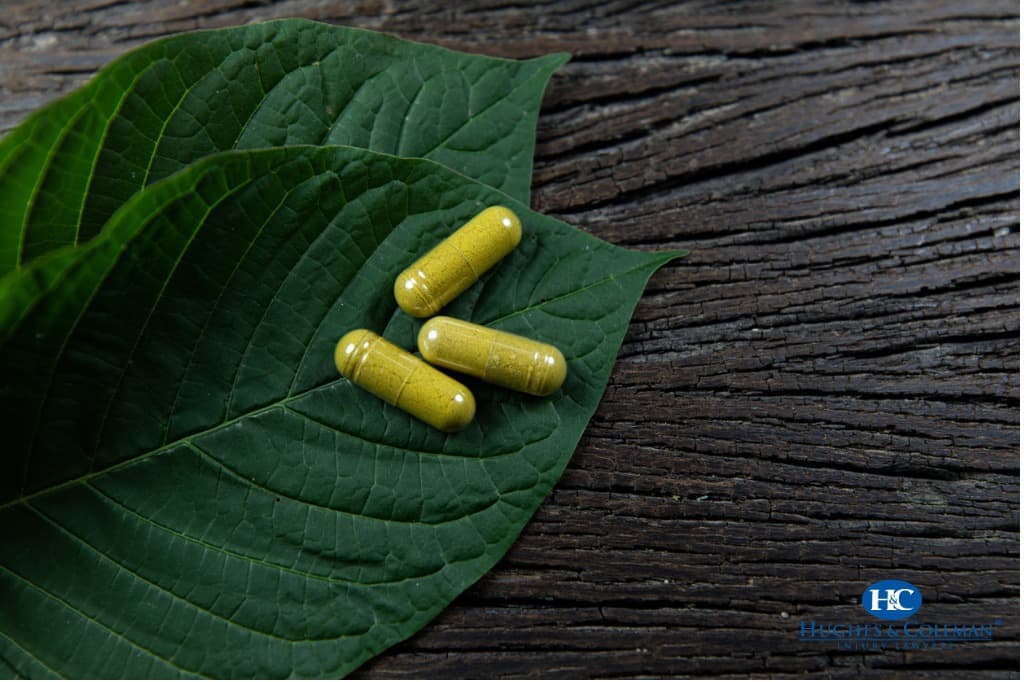-

Kratom – a substance regularly consumed as a pain reliever by about 5 million Americans – has been targeted by federal regulatory bodies and outlawed by legislators in several states. In this two-part article, we explain the kratom controversy and explore litigation options for affected individuals.
With tens of thousands of deaths from overdoses every year, opioid abuse is one of the greatest medical crises the U.S. has faced in the last decade. As evidence suggests, this unnecessary epidemic has been largely caused by irresponsible and, at times, outright dishonest marketing tactics employed by big pharma companies. Thus, in order to both curb the current crisis and prevent other similar ones from occurring, legislators in many states across the country are now taking a much firmer stance on regulating other drugs that may pose a threat to public health. Out of these, a popular yet controversial substance called kratom is now becoming a target of public and governmental scrutiny more and more frequently, with a number of states having introduced legislative measures aimed at regulating its sales and availability.
This two-part article will offer a brief overview of the unfolding kratom controversy. First, we will provide basic information about the drug and the reasons why it may be considered dangerous. Then, we will summarize the recent regulatory actions taken by some states. We will also answer the question of whether it is possible to take legal action against the manufacturers of kratom-based products after experiencing adverse health effects that may have been caused by the drug.
What Is Kratom?
Kratom is a common market name of a substance manufactured from mashed leaves of a tropical tree called Mitragyna speciosa also known as biak-biak. The tree belongs to the coffee family and is native to Southeast Asia. Due to its psychoactive properties, it has been used as a natural remedy in countries like Thailand, Indonesia, Malaysia or Myanmar. The leaves of Mitragyna speciosa contain two potent alkaloids – mitragynine and 7-hydroxymitragynine. These chemical compounds stimulate the brain in a way similar to the way opioids do. As reported by The New York Times, kratom “has long been used as a mood booster, energy supplement and pain reliever” and is “sold in the United States online and in bodegas and head shops”. Kratom consumption across the U.S. has been growing in recent years and, according to the American Kratom Association, “nearly five million Americans consume kratom safely each year”.
Is Kratom Safe?
Due to its pain-relieving properties, Kratom is also sometimes mentioned as an effective way to fight opioid addiction since, according to former opioid addicts, it can replace popular opioid drugs as a remedy for persistent, dulling pain. However, in order for kratom to have this effect, it must be consumed in large quantities. This sparks the concern of some regulatory bodies as it is believed that using kratom as a substitute for opioid painkillers simply replaces dependence on one drug with dependence on another.
Notably, the U.S. Food and Drug Administration (FDA) has issued several kratom-related warnings over the last few years. For example, in a statement released in 2017, the administration noted that the substance “affects the same opioid brain receptors as morphine” and “appears to have properties that expose users to the risks of addiction, abuse, and dependence.” Since then, the FDA has continued to advise the public “not to use any products labeled as containing the botanical substance kratom or its psychoactive compounds, mitragynine and 7-hydroxymitragynine”.
The strongest argument against the use of kratom, however, seems to come from a worrisome report published in April by the Centers for Disease and Control and Prevention (CDC) that links kratom to a growing number of deaths from unintentional overdoses. The analysis examined 27,000 overdose deaths reported across 27 different states in the period of 18 months ending in December 2017. According to the CDC, in that period, kratom was found to be a direct cause of 91 unintentional overdose deaths and was linked to a total of 152 fatalities. These new numbers represent an increase of almost 100% since previously only 44 kratom-related deaths had been reported.
Additional Reading: Is Kratom Legal In Tennessee?
Get In Touch Today!
We offer free consultations 24/7 and there will always be someone here to take your call. Call our personal injury lawyers today for a free consultation or fill out this form and we will contact you.
We serve clients across Tennessee and Kentucky and we have several offices throughout both states. See all of our locations and contact us today.


